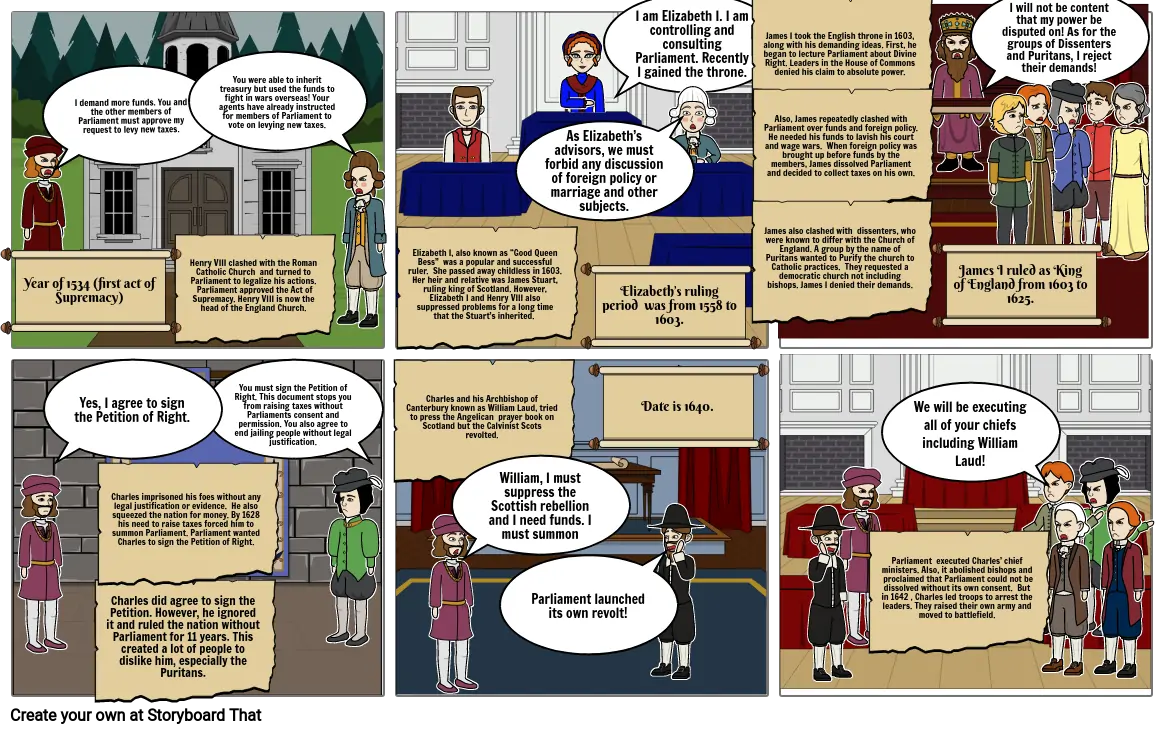World Civ II

Süžeeskeem Tekst
- Year of 1534 (first act of Supremacy)
- I demand more funds. You and the other members of Parliament must approve my request to levy new taxes.
-
- Henry VIII clashed with the Roman Catholic Church and turned to Parliament to legalize his actions. Parliament approved the Act of Supremacy. Henry VIII is now the head of the England Church.
- You were able to inherit treasury but used the funds to fight in wars overseas! Your agents have already instructed for members of Parliament to vote on levying new taxes.
- Elizabeth I, also known as “Good Queen Bess” was a popular and successful ruler. She passed away childless in 1603. Her heir and relative was James Stuart, ruling king of Scotland. However, Elizabeth I and Henry VIII also suppressed problems for a long time that the Stuart’s inherited.
- As Elizabeth’s advisors, we must forbid any discussion of foreign policy or marriage and other subjects.
- Elizabeth’s ruling period was from 1558 to 1603.
- I am Elizabeth I. I am controlling and consulting Parliament. Recently I gained the throne.
- James I took the English throne in 1603, along with his demanding ideas. First, he began to lecture Parliament about Divine Right. Leaders in the House of Commons denied his claim to absolute power.
- James also clashed with dissenters, who were known to differ with the Church of England. A group by the name of Puritans wanted to Purify the church to Catholic practices. They requested a democratic church not including bishops. James I denied their demands.
- Also, James repeatedly clashed with Parliament over funds and foreign policy. He needed his funds to lavish his court and wage wars. When foreign policy was brought up before funds by the members, James dissolved Parliament and decided to collect taxes on his own.
- James I ruled as King of England from 1603 to 1625.
- I will not be content that my power be disputed on! As for the groups of Dissenters and Puritans, I reject their demands!
- Yes, I agree to sign the Petition of Right.
- Charles did agree to sign the Petition. However, he ignored it and ruled the nation without Parliament for 11 years. This created a lot of people to dislike him, especially the Puritans.
- Charles imprisoned his foes without any legal justification or evidence. He also squeezed the nation for money. By 1628 his need to raise taxes forced him to summon Parliament. Parliament wanted Charles to sign the Petition of Right.
- You must sign the Petition of Right. This document stops you from raising taxes without Parliaments consent and permission. You also agree to end jailing people without legal justification.
- Charles and his Archbishop of Canterbury known as William Laud, tried to press the Angelican prayer book on Scotland but the Calvinist Scots revolted.
- William, I must suppress the Scottish rebellion and I need funds. I must summon Parliament
- Parliament launched its own revolt!
- Date is 1640.
- Parliament executed Charles’ chief ministers. Also, it abolished bishops and proclaimed that Parliament could not be dissolved without its own consent. But in 1642 , Charles led troops to arrest the leaders. They raised their own army and moved to battlefield.
- We will be executing all of your chiefs including William Laud!
- James I continuously clashed with Parliament, debating over money and foreign policy. James needed money to wage wars and also lavish his court. When members decided to bring up foreign policy before funds, James I decided to collect taxes on his own.
- James I took the English monarch in 1603, along with his demanding ideas. First, he began lecturing Parliament about Divine Right. Leaders in the House denied his claim to absolute power. James I clashed with Parliament over funds and foreign policy.
- Henry broke with Roman Catholic Church and turned to Parliament to legalize his actions. Parliament approved the Act of Supremacy. However, Henry was always begging Parliament for money.
- Charles did agree to sign the Petition of Right. However, he dissolved Parliament in 1629. He ignored the petition and ruled without Parliament. This developed a lot of people that disliked him especially by Puritans.
- Charles did agree to sign the petition. However, he ignored the Petition and decided to rule the nation without Parliament. This created a lot of people to dislike him, especially Puritans.
Loodud üle 30 miljoni süžeeskeemi

